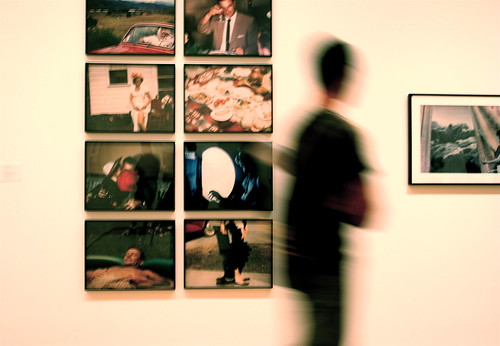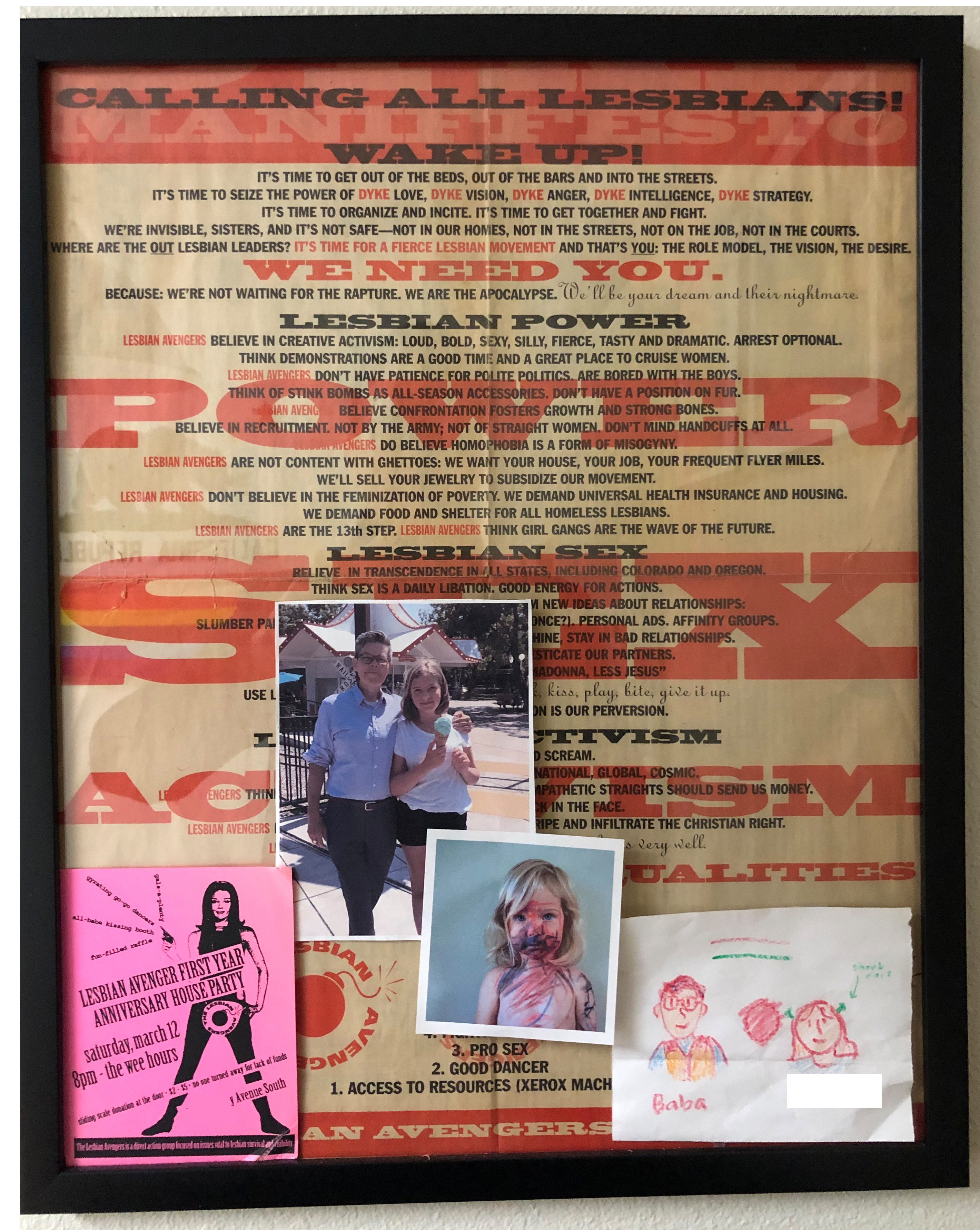
At the Museum of Modern Art, NYC: A passerby, passing by Larry Sultan’s “Film Stills from the Sultan Family Home Movies 1943-72.”
Happy Blogging for LGBT Families Day, Dana Rudolph’s inspired jamboree of blogular LGBT family love and visibility! For those of us who are L or G or B or T, and whose writing online is occasioned by and peopled with our families, every day is Blogging for LGBT Families Day. It’s Blogging for LGBT Families Day when we write about the tempest-toss’d route from wannabe to actual parenthood (an epic journey, pretty much, for all of us). It is when we write about our queer families’ experiences of exclusion — or inclusion — at the childbirth education class at the hospital, or at the adoption agency, or at the preschool orientation, or in our kids’ schools’ educational materials. It’s Blogging for LGBT Families Day when we share our children’s brave and heartwarming statements of pride in their families, like Vikki has on her blog Up Popped a Fox.
But it’s also Blogging for LGBT Families Day when we write about the kinds of day-to-day conception or adoption or surrogacy woes that couples in straight families face. Because many of them face those woes too, and we can provide them compassion, and probably some fresh insight. After all, it’s not a matter of shame or embarassment or bodily challenge that we need help in forming our families: it’s how we do it, and we know a lot about how. It’s Blogging for LGBT Families Day when those of us who are LGBT single parents write about the challenges and rewards of that solo journey. For that matter, it’s Blogging for LGBT Families Day when any of us write of the joys and trials of parenthood that everyone shares. In these moments—and we all know, they constitute most moments of the day—we are being parents, the same as any other parents. Only different.
There’s an odd paradox about every civil rights struggle. The aggrieved group, in agitating to receive the civil rights to which others are entitled (e.g., access to the institution of marriage and its legal protections), is ultimately demanding not special treatment, but ordinary treatment. The absence of discrimination equals the presence of ordinariness.
So when we work to make LGBT families visible—such as through group participation in online events such as this one—we are ultimately working to make these families so evident that we eventually become ordinary. We’re working to make the unfamiliar familiar, so that it may eventually become part of the fabric of American family life, the way, over the past generation or so, “blended†families post-divorce and remarriage have, or interracial ones, or families headed by single mothers or fathers. We’re on our way to becoming nothing more nor less special than a new weave in that rich, multi-colored fabric. Of course until we are more fully integrated into dominant visions of family—until, in other words, the pernicious impact of homophobia/heterosexism diminishes, and our kids’ schools and doctors and peers and peers’ parents and books and cultural products include, as a matter of course, our families’ images and stories—we will be special. We will be exceptional.
But while being exceptional can feel like a pain or even a trial, it can also empower. It’s a well-documented social phenomenon that attacks from outside a group — attacks meant to isolate — catalyze a stronger sense of cohesion and identity from within it. Amazing bonds are formed as a direct result of the very duresses our families endure, familiar to anyone who has engaged in any civil rights battle. (LGBT historians would tell us, by the way, that gay people weren’t really a gay “people†until they began to be persecuted more and more fiercely.)
This chapter of the LGBT civil rights battle is different from previous ones, however. I’d even go so far as to say that it’s exceptional. Because we are now defending not just ourselves, but our children. And that, I would argue, explodes the numbers of us willing to speak out and act, and the passion with which we do so. Ask any parent of any stripe how powerful that feeling of protectiveness is. Is it any wonder that the classic illustration of people’s capacities for super-human strength (whether folk truth or real) is the scenario in which someone manages to hoist a car from on top of a kid trapped underneath it?
Queer families share that fierce sense of protectiveness with all other families, generally. Given how hard we worked to have our kids in the first place, you can’t imagine we don’t want them to grow up well, and we’ll do all the things other parents do to see to that. Good nutrition, good education, ample opportunities. The same old stuff. But with an added difference. Together with other queer families and our allies, we’re working to lift a heavy weight—the social impact of homophobia/heterosexism—off the bodies of our children. That bonds us, and the bond is palpable across all these posts on Blogging for LGBT Families Day.
Vikki’s son Miguel wrote and sang a song with the repeated refrain, “My family is different.†And he’s right. His family is different. It’s the same as any other assemblage of loving adults raising children. Only different.


Greetings from Grinnell Iowa!
Great post Polly!